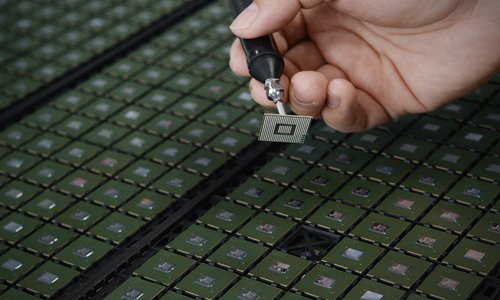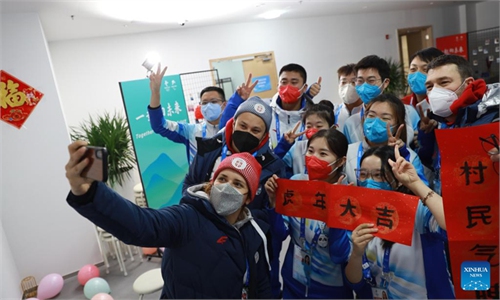
Self-developed main control chips developed by a company based in Shanghai are showcased in April. Photo: VCG
TikTok owner ByteDance has unveiled plans to design its own chips, joining other Chinese technology companies and internet giants that have focused on semiconductors.In response to recent media coverage of ByteDance's self-developed chips, Yang Zhenyuan, vice president of ByteDance, said on Wednesday that the company's plan for self-designed semiconductors will focus on customizing chips for its video recommendation services with a goal to optimize efficiency and productivity.
"Our R&D team will work on the optimization of hardware used to power the company's video technologies including video codec, cloud inference acceleration and others," Yang said.
Yang cautioned that ByteDance has no plan to develop chips for sale and will not be involved in businesses such as Central Processing Units (CPUs) and Graphics Processing Units (GPUs). ByteDance procures X86 chips and is considering customizing RISC chips working with suppliers for cloud scenarios.
To have a footprint in the semiconductor sector seems to be a "standard configuration" among Chinese tech giants, and it indicates that firms are giving similar attention to both software and hardware, in an effort to improve customer experience as market competition intensifies, Ma Jihua, a veteran technology analyst, told the Global Times on Wednesday.
Concerns over intellectual property and possible US sanctions have worked to accelerate investment, Ma said.
But Ma noted that based on the current information, ByteDance's chip business does not touch on the "most difficult area," so the work will not be "that tough".
According to a report from the chinastarmarket.cn, ByteDance has been hiring chip-related engineers on a large scale, and positions in demand include SoC model performance analysis, verification, underlying software and driver development, low-power design, as well as chip security.
Previously, Alibaba, smartphone maker Xiaomi, Huawei, as well as Vivo and OPPO, all announced plans or investment in semiconductors.
"To develop their own chips will help the tech companies build their own ecosystem," Liu Dingding, a close follower of China's internet industry, told the Global Times on Wednesday.
In June, China formally released the STAR Chip Index to track the performances of leading firms in semiconductor materials and equipment, chip design, and chip packaging and testing, aiming to attract more investment into the increasingly important industry amid a broadening US government crackdown.
The rollout of the index is expected to diversify investors' options, funneling more capital into the integrated circuit industry.



